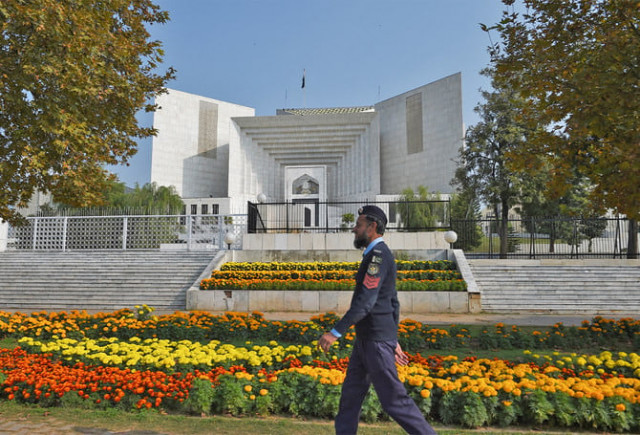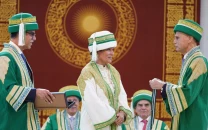SC sets guidelines for acquittal in criminal cases
Says 265-K CrPC empowers courts to acquit an accused anytime even before the charge is framed and complainant heard

The Supreme Court has given guidelines regarding invoking of section 265-K of the Criminal Procedure Code (CrPC) for the acquittal of accused persons in criminal cases.
Section 265-K of the CrPC empowers the courts to acquit an accused anytime even prior to the framing of a charge as well as hearing of the complainant.
A three-member bench of the apex court led by CJP Umar Ata Bandial issued guidelines to courts for deciding the acquittal of accused persons in criminal cases.
The judgment was authored by Justice Syed Mansoor Ali Shah while quashing the NAB reference against Shell oil firm.
It noted that ordinarily, an accused, who invokes Section 265-K5 CrPC for his acquittal, pleads on mainly four grounds – firstly, that the facts alleged by the prosecution do not constitute commission of offence; secondly, that there is no evidence or incriminating material on record of the case; thirdly, that the evidence or incriminating material collected during investigation in support of the commission of the alleged offence and proposed to be produced during trial is insufficient and, even if recorded, will not sustain conviction of the accused and fourthly, that the prosecution evidence so far recorded does not make out a case for conviction of the accused, of any offence in the case and the remaining prosecution evidence, even if recorded, will not improve the prosecution case against the accused in any manner
The order said that it was the fourth ground that attracts the application of the rule of practice and priority referred to by the Sindh High Court and, that too, when the trial is near completion, that is, when almost the whole of the prosecution evidence has been recorded.
Read SBP challenges FSC Riba verdict in SC
It emphasised that the wisdom behind the rule was that the appraisal of almost the whole prosecution evidence when the trial is near completion, for deciding the application under Section 265-K CrPC amounts to pre-judging the case before the final judgment, which not only reduces the sanctity and strength of the final judgment but may also prejudice the case of the other accused, if any, undergoing trial.
Any such exercise does not, therefore, serve the ends of justice.
"This rule thus has no relevancy or application to the first three grounds, which do not involve the appraisal of the prosecution evidence recorded during the trial.”
The order said that there can be no cavil to the rule of practice and propriety, referred to by SHC that when the trial is near completion, the fate of the case should not ordinarily be decided under Section 265-K of the CrPC.
"There may however be such exceptional circumstances which may justify departure from the said rule as there is hardly any rule of practice which does not admit exception(s). Even otherwise, Section 265-K of the CrPC provides that the trial court can make an order of acquittal at any stage of the case, and such stage may be an initial stage of the case on taking cognisance before the recording of the prosecution evidence, or it may be a later stage of the case after a recording of some evidence of the prosecution."
"No absolute bar, in derogation of the law, can therefore be put on the statutory power of the trial court to entertain an application under section 265-K, CrPC and decide upon its merits at a later stage of the trial if the exceptional circumstances of the case call for so doing to prevent the abuse of the process of court or to secure the ends of justice"
"The high court has, however, failed to appreciate that the said rule has no application to a ground pleaded by an accused for his acquittal under Section 265-K of the CrPC, which does not require an appraisal of the prosecution evidence recorded during trial, such as the ground pleaded by the Petitioners in the present case,” the judgement said.



















COMMENTS
Comments are moderated and generally will be posted if they are on-topic and not abusive.
For more information, please see our Comments FAQ